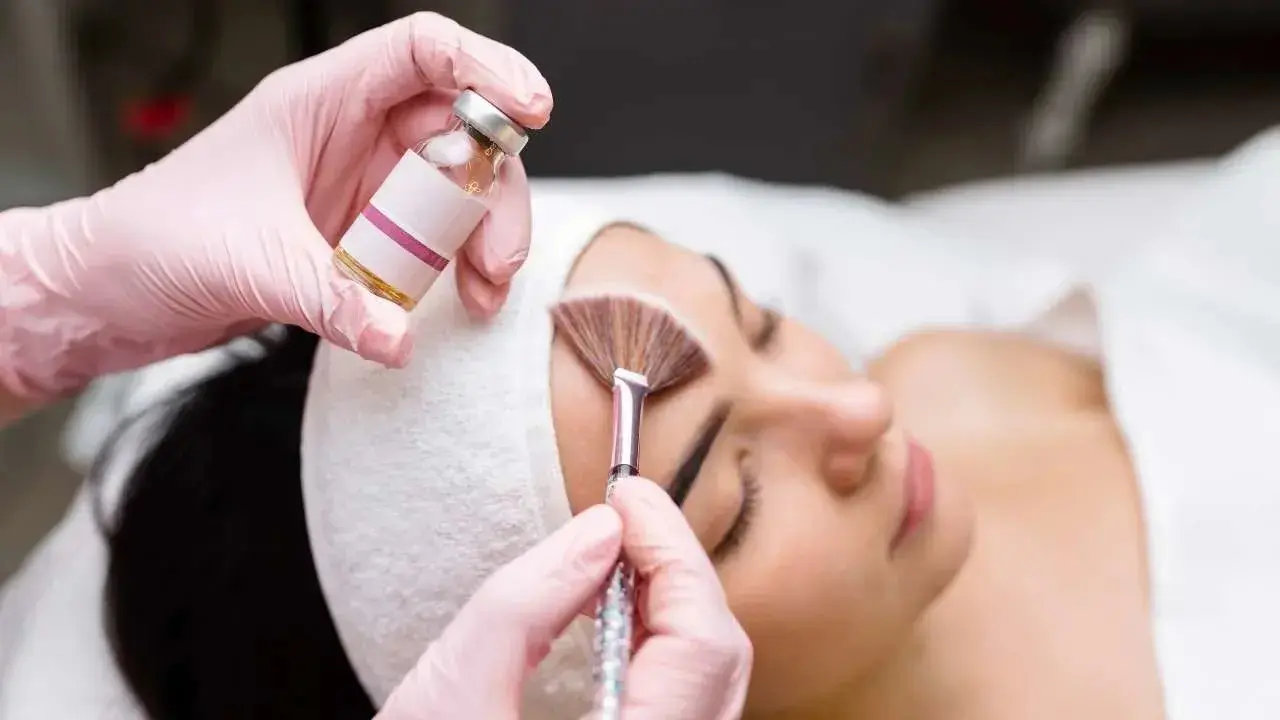
if you’ve been considering skin resurfacing in Las Vegas, you’ve probably heard about chemical peels. They’re one of the most effective non-invasive treatments for improving skin texture, reducing breakouts, and brightening dull complexions. But choosing the right chemical peel for your skin type makes all the difference between great results and unnecessary irritation.
At Rarev, our expert team provides customized chemical peel treatments designed for the unique challenges of desert-dry, sun-exposed Las Vegas skin. This guide explains how different formulas work, the types of chemical peels available, and how to match the treatment to your skin’s specific needs.
What Is a Chemical Peel Treatment?
A chemical peel is a skin-resurfacing procedure where a chemical solution is applied to the skin to remove the top layers. This process encourages cell turnover, leading to smoother, clearer, and more even-toned skin over time.
Peels range in strength and ingredients. Some are mild and work on the outermost layer of skin, while others target deeper skin concerns like scarring, sun damage, or deep wrinkles. The right peel depends on both your skin type and your skincare goals.
Types of Chemical Peels
Understanding the different types of chemical peels helps make a more informed choice about what’s safe and effective for your skin.
1. Superficial Peels (Light Peels)
These are the mildest form of peels, typically using alpha-hydroxy acids (AHAs) like glycolic or lactic acid. Superficial peels are a common option for chemical peels for sensitive skin, minor texture issues, or dullness. They exfoliate gently and require little to no downtime.
Best for:
- First-time peel users
- Mild discoloration
- Uneven tone or texture
2. Medium Peels
Medium peels go a bit deeper, often using trichloroacetic acid (TCA) or a higher concentration of glycolic acid. They’re effective for acne scars, moderate pigmentation, and fine lines.
These peels often require a few days of peeling and redness but offer more dramatic results than light peels.
Best for:
- Chemical peel for acne scars
- Moderate sun damage
- Melasma and dark spots
3. Deep Peels
Deep peels reach the inner layers of skin and use stronger acids like phenol. These are not typically offered at salons—they require a medical setting and come with significant recovery time. While they deliver strong results, they’re not suited for all skin tones or types.
Best for:
- Deep wrinkles
- Severe sun damage
- Tough pigmentation issues
Choosing the Best Chemical Peel for Your Skin Type
Different skin types react to chemical peels differently. Matching the treatment to your specific skin type ensures better results and a safer experience.
1. Oily Skin
Oily skin can benefit from peels that reduce sebum and prevent clogged pores. Salicylic acid peels are especially effective here, as they cut through oil and help manage breakouts.
Best chemical peel for oily skin:
- Salicylic acid peels
- Jessner’s peel (combines salicylic, lactic, and resorcinol)
What it helps with:
- Acne
- Enlarged pores
- Blackheads
2. Dry Skin
Dry skin types need peels that exfoliate without stripping too much moisture. Glycolic acid peels (especially low-strength) work well by removing flaky patches and boosting hydration through cell turnover.
Chemical peels for dry skin:
- Lactic acid peels (hydrating and gentle)
- Glycolic acid (low concentration)
What it helps with:
- Dullness
- Rough patches
- Fine lines
3. Combination Skin
For combination skin, the goal is balance—treating oiliness without aggravating dryness. Mandelic acid peels are a smart choice, offering mild exfoliation without irritation.
Best chemical peel for your skin type if it’s combination:
- Mandelic acid
- Low-dose glycolic or lactic acid
What it helps with:
- Uneven texture
- T-zone congestion
4. Sensitive Skin
This skin type needs extra caution. Peels should be extremely gentle and free from strong actives. Lactic acid is one of the mildest and is often used in chemical peels for sensitive skin.
Gentle chemical peels for sensitive skin:
- Lactic acid (low strength)
- Enzyme-based peels (like papaya or pumpkin)
What it helps with:
- Uneven tone
- Mild dullness
5. Aging Skin
Aging skin often benefits from a combination of hydration and collagen stimulation. TCA peels and glycolic acid can help reduce fine lines, age spots, and uneven tone.
Best chemical peels for aging skin:
- TCA medium peel
- Glycolic acid peels (mid to high strength)
What it helps with:
- Fine lines
- Age spots
- Skin laxity
6. Acne-Prone Skin
For acne-prone skin, the goal is to unclog pores and reduce inflammation. Salicylic acid is the top choice, but mandelic acid is a great, gentler option for active breakouts.
Chemical peels for acne-prone skin:
- Salicylic acid
- Mandelic acid
- Jessner’s solution
What it helps with:
- Acne control
- Scarring
- Oily zones
What to Expect During a Chemical Peel Treatment
Here’s a general breakdown of what happens during a chemical peel session:
- Consultation: Your skincare provider will assess your skin and select the right formula.
- Preparation: Your skin will be cleansed, and any oils or residues removed.
- Application: The peel is applied and left on for a few minutes, depending on strength.
- Neutralization: Some peels require neutralizing, while others self-neutralize.
- Aftercare: You may receive a post-treatment cream or sunscreen. Your skin might feel tight, red, or slightly irritated for a few days.
Peeling (if any) typically starts around day two or three and lasts up to a week, depending on the strength.
Wrapping It Up
Choosing the right chemical peel isn’t just about results—it’s about working with your skin’s needs. Whether you’re looking for a chemical peel for oily skin, targeting scars, or trying chemical peels for dry skin, Rarev’s team in Las Vegas can help you achieve radiant, healthy skin safely.
💆♀ Ready to refresh your skin?
Book your Las Vegas chemical peel consultation at Rarev today and get a treatment plan tailored just for you.
📞 Call us now or 📅 [Book Online] to reserve your spot.

